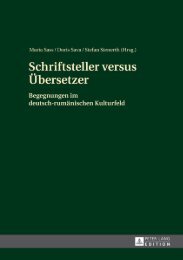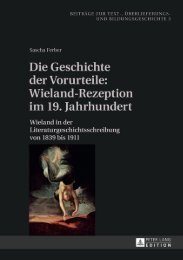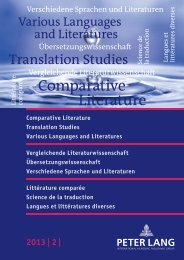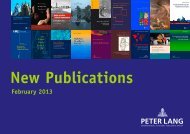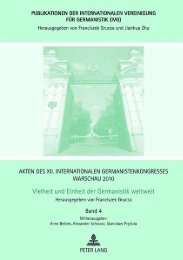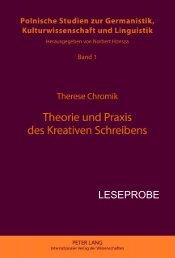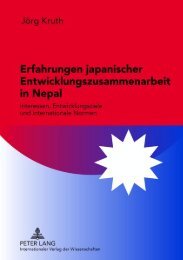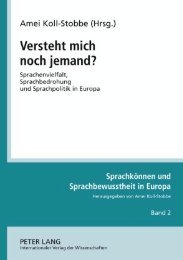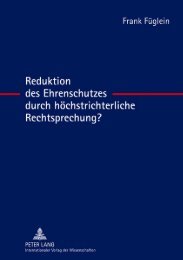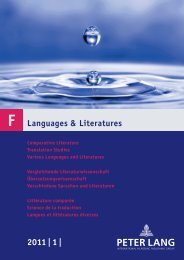T - Peter Lang
T - Peter Lang
T - Peter Lang
You also want an ePaper? Increase the reach of your titles
YUMPU automatically turns print PDFs into web optimized ePapers that Google loves.
María Jesús Blasco Mayor •<br />
María Amparo Jimenez Ivars (eds .)<br />
Interpreting naturally<br />
A Tribute to Brian Harris<br />
Bern, Berlin, Bruxelles, Frankfurt am Main,<br />
New York, Oxford, Wien, 2011 .<br />
XII, 242 pp ., num . ill ., tables and graphs<br />
I<br />
pb . ISBN 978-3-0343-0588-4<br />
CHF 70 .– / € D 53 .50 / € A 55 .– / € 50 .– /<br />
£ 45 .– / US-$ 74 .95<br />
eBook ISBN 978-3-0351-0306-9<br />
n this book, we aim to bring together seminal<br />
approaches and state-of-the-art research<br />
on interpretation as a tribute to Brian<br />
Harris’ influential legacy to Translatology and<br />
Interpreting Studies . Whenever Harris has sat<br />
down to reflect and write, he has paved the way<br />
to new approaches and promising areas of research<br />
. One of his most outstanding contributions<br />
is the notion of natural translation, i .e .,<br />
the idea that all humans share an intuitive capacity<br />
to translate which is co-extensive with<br />
bilingualism at any age, regardless of language<br />
proficiency . This contribution has proved pivotal<br />
to translation and interpreting research .<br />
In a world where most individuals speak more<br />
than one language, and therefore millions of<br />
translational acts are performed every second<br />
by untrained bilinguals, the concept of natural<br />
translation provides the arena for T&I scholars<br />
to discuss issues directly related to or stemming<br />
from it, such as bilingualism, language<br />
brokering, community/public service and diplomatic<br />
interpreting, all of them paramount<br />
to interpreting research and the future of the<br />
profession .<br />
Contents: Ann Corsellis: Preface • Brian<br />
Harris: Life of Brian Harris • María Jesús Blasco<br />
Mayor/Amparo Jiménez Ivars: Introduction •<br />
Brian Harris: ¡Cuéntame cómo pasó! – a memoir<br />
of machine translation in Montreal circa<br />
1970 • Ricardo Muñoz Martín: Nomen mihi Legio<br />
est – a cognitive approach to natural translation<br />
• Robert M . Maier: Towards a Psycholinguistic<br />
Model of Translation Processses: directionality<br />
in Natural Translation • Claudia V .<br />
Angelelli: Expanding the Abilities of Bilingual<br />
Youngsters: can translation and interpreting<br />
help? • Carmen Valero Garcés/Nerea Martínez<br />
Gutiérrez: The Student – Tutor: a natural interpreter<br />
in the 21st century • Ann Corsellis: Seven<br />
EU Projects – a journey towards a regulated language<br />
profession • María Manuela Fernández<br />
Sánchez: Interpreting in the Cold War: military,<br />
political and diplomatic settings • Miriam Shlesinger:<br />
The ‘True Interpreter’ Revisited: on (im)<br />
partiality and (in)consistency in court interpret-<br />
Science de la traduction · Übersetzungswissenschaft · Translation Studies<br />
ing • Franz Pöchhacker: NT and CI in IS: taxonomies<br />
and tensions in interpreting studies .<br />
María Jesús BlasCo Mayor and aMparo<br />
JiMénez iVars lecture in Interpreting at Universitat<br />
Jaume I (Castellón, Spain) . They have<br />
both worked as interpreters and translators .<br />
Elena Di Giovanni (ed .)<br />
Diálogos intertextuales 5<br />
Between Text and Receiver:<br />
Translation and Accessibility<br />
Entre texto y receptor:<br />
traducción y accesibilidad<br />
Frankfurt am Main, Berlin, Bern, Bruxelles,<br />
New York, Oxford, Wien, 2011 .<br />
259 pp ., num . fig ., tables and graphs<br />
T<br />
pb . ISBN 978-3-631-58920-5<br />
CHF 66 .– / € D 49 .80 / € A 51 .20 / € 46 .50 /<br />
£ 41 .90 / US-$ 69 .95<br />
he volume brings together up-to-date contributions<br />
on translation and accessibility,<br />
with a major focus on audiovisual texts, their<br />
translations and receivers across languages and<br />
cultures . Featuring studies of dubbing, interlingual<br />
subtitling, subtitles for the Deaf and Hard<br />
of hearing (SDH), audio description and other<br />
translation techniques, as they are employed and<br />
developed across Europe, the book also covers<br />
all the major issues related to the reception of<br />
translated and accessible texts . Five essays focus<br />
on children as unique viewers and receivers of<br />
translated audiovisual texts, thus providing a<br />
valuable contribution to the development of research<br />
in audiovisual translation for children .<br />
Contents: Elena Di Giovanni: Connecting<br />
the dots in audiovisual translation research:<br />
W<br />
Michèle Cooke<br />
The Lightning Flash<br />
e don’t say what we mean . We don’t<br />
mean what we say . No-one can tell<br />
the truth – especially when we stick to the<br />
facts . <strong>Lang</strong>uage isn’t about words, or information,<br />
or things . It’s always about us . As<br />
with music and painting, we use language to<br />
express what we are not able to say . And we<br />
Translation, reception, accessibility and children<br />
• José María Bravo: Las nuevas tendencias<br />
de la traducción cinematográfica • José Yuste<br />
Frías: Traducir para la pantalla: el traductor entre<br />
el texto y la imagen • José Manuel Sande<br />
García: Una historia del doblaje en España • Luis<br />
Alberto Iglesias Gómez/Mercedes Ariza: The use<br />
of explicit translation in dubbing for children .<br />
Two case studies • Marta García González/María<br />
Teresa Veiga Díaz: Screen translation as a language<br />
planning tool: An analysis of Galician<br />
dubbed animated films • Beatriz Rodríguez: Current<br />
literary translation: Analysis of the Spanish<br />
and Galician translations of Paul Auster’s<br />
The Brooklyn Follies • Karen Joan Duncan Barlow:<br />
Can political correctness interfere in translating?<br />
On the Spanish subtitles of «Class»<br />
and «Mama Morton» in Chicago • Pilar Orero:<br />
Audio description for children: Once upon a<br />
time there was a different audio description for<br />
characters • Lourdes Lorenzo/Ana Pereira: Deaf<br />
children and their access to audiovisual texts:<br />
Educational failure and the helplessness of the<br />
subtitler • Irene Pazó: La adaptación del subtitulado<br />
para personas sordas • Almudena Pérez de<br />
Oliveira: El subtitulado para sordos en las principales<br />
cadenas de televisión en España • Nela<br />
Justo Sanmartín: El subtitulado para sordos y<br />
personas con discapacidad auditiva en Inglaterra<br />
• María Estrella Moreira: Subtitulos para<br />
sordos en la televisión alemana • Shaila Varela<br />
Romero: Subtitulado para sordos: camino hacia<br />
una normativa . Análisis del éxito comunicativo<br />
de Chicken Run (Evasión en la Granja) y<br />
Pinocho 3000 .<br />
elena Di GioVanni is lecturer in translation<br />
at the University of Macerata (Italy), where<br />
she is also Director of the <strong>Lang</strong>uage Centre .<br />
<strong>Lang</strong>uage, longing and the facts of life<br />
Frankfurt am Main, Berlin, Bern, Bruxelles, New York, Oxford, Wien, 2011 .<br />
162 pp ., 8 fig .<br />
Translation Happens . Vol . 1<br />
Edited by Michèle Cooke<br />
hb . ISBN 978-3-631-59714-9<br />
CHF 44 .– / € D 29 .80 / € A 30 .70 / € 27 .90 / £ 25 .10 / US-$ 43 .95<br />
can all do it . We all create our own poetry . It<br />
is not words that we understand, but the myriad<br />
meanings of silence that lie beyond them .<br />
MiCHèle Cooke is Associate Professor at<br />
the University of Vienna, where she teaches<br />
translation and intercultural communication<br />
.<br />
Order online at www.peterlang.com<br />
21



